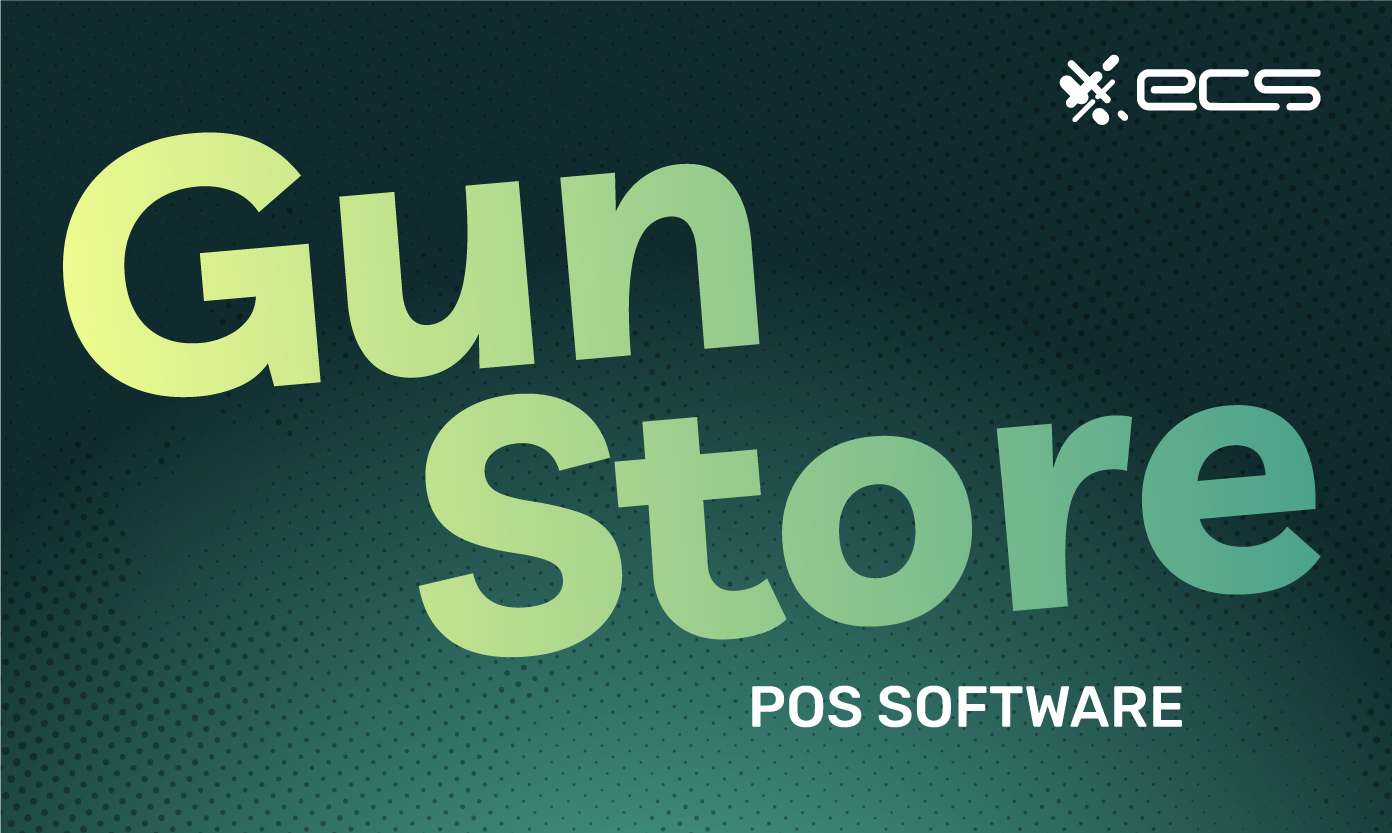Point of sale (POS) systems have become irreplaceable across many industries. From retail to restaurants, businesses realize the added benefits a POS system can offer them. This couldn’t be more true for businesses that sell firearms. If you sell firearms in the United States, there are added regulatory burdens and bookkeeping that you must adhere to. Choosing the right gun store POS software makes this compliance much easier, reducing the risk of errors that can threaten your licensing.
Beyond regulatory compliance, a POS system has many business benefits that gun stores can take advantage of. From keeping track of inventories to integrating online sales, all of these can help gun stores lower costs. It can also help you to find ways to improve market share and revenue.
Below, we’ll go over the basics of gun store POS software and how it can streamline operations and add e-commerce functionality to a brick-and-mortar business.
What Is Included in Gun Store POS Software?
POS software systems combine many traditional functions of the checkout process, like accepting credit card payments or cash, with more advanced features to help business operations.
Each POS system can operate differently, but most offer functions for inventory tracking, accounting, employee tracking, and other advanced features.
In a firearms retail industry setting, a POS system for a gun store comprises three distinct components.
Gun Store POS Hardware
Your POS hardware will include any terminals needed for accepting credit or debit cards. These can be standalone card readers that you may already have, which you can connect to the POS system.
You can also integrate card readers for mobile devices or contactless payments into the POS hardware itself, depending on the retail environment.
The other part of the POS hardware is the computer and interface that runs the applications. Most modern POS hardware uses a touch screen as the interface. This is how employees and staff at your gun store interact with the system.
Some systems will also have a customer-facing touchscreen. This is optional but can provide easier communication during complex checkout procedures such as gun purchases.
Finally, you can integrate other hardware with the POS system. For example, a gun store will likely also need a barcode scanner for scanning sold items and driver’s licenses and IDs during gun sale verification procedures.
You will also need a printer for receipts. These are generally thermal printers configured to connect to and work with your chosen POS terminal.
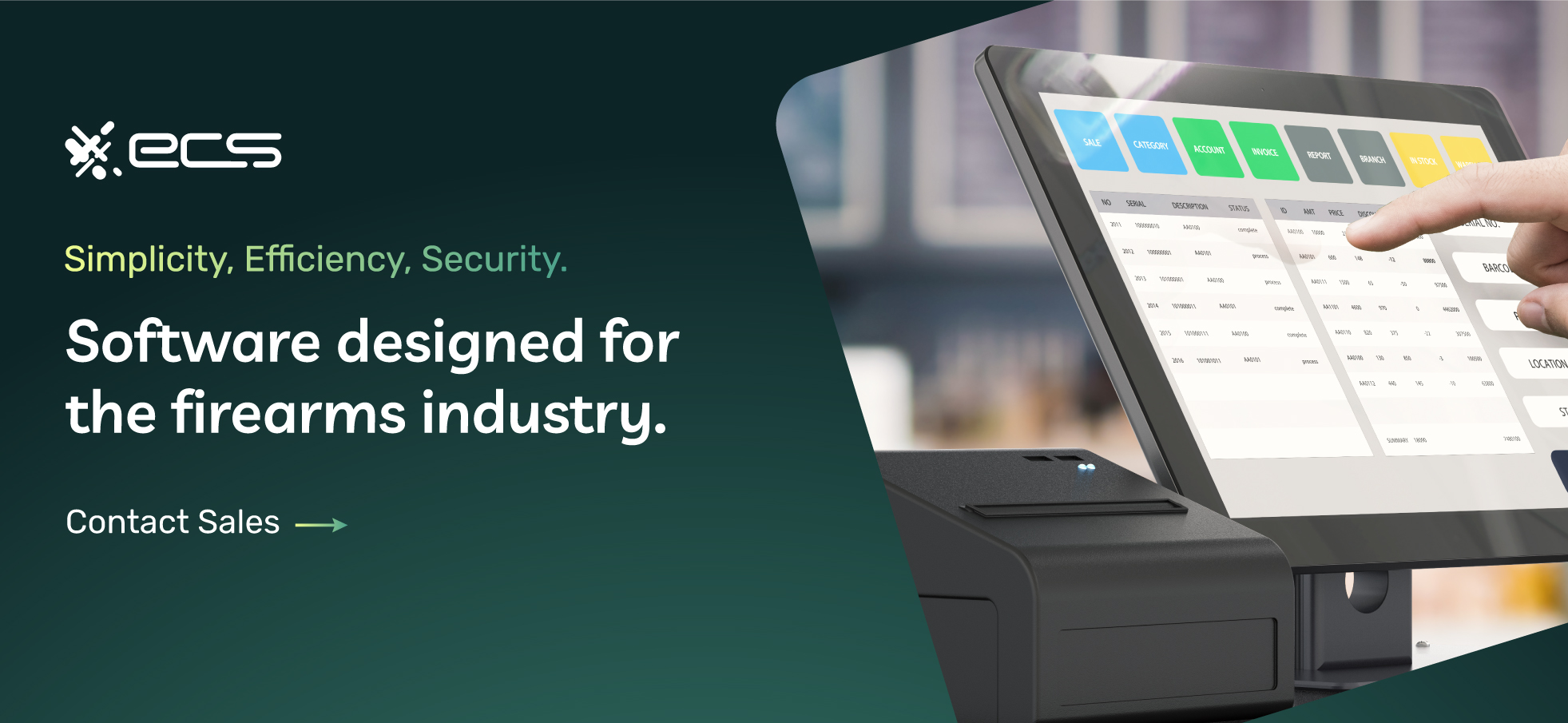
Gun Store POS Software
The gun store POS software manages all the transactions and interfaces with any existing business software you may be running.
There are two categories of POS software that most businesses use. One is on-premise software. This means it is installed on the hardware that runs it and can generally not be accessed from other computers.
You must do any updates, backups, and other security and recovery functions with these on-premise POS software systems manually. However, some businesses prefer the control that an on-premise solution provides.
The next type of POS software is cloud-based. This means that most data and some parts of the software are run on remote servers the POS vendor maintains. The POS hardware communicates with the software and data in the cloud and displays the information on the POS screen.
Most security functions are left to the POS vendor. Therefore, for many in the firearms retail industry, cloud-based software is the best option. Assuming the POS vendor is reputable, it should follow security and data protection best practices.
Another benefit of cloud-based POS software is that it makes it much easier to manage multiple locations. For example, if you own three gun stores, you can update all the prices in all your stores from one location. The new pricing information is automatically pushed to all your POS systems without manually visiting each location.
The same goes for any updates or changes you must make to your system. With an on-premise solution, making changes across multiple locations is much more time-consuming.
Gun Store Payment Processor
The final component of a gun store POS is payment processing. The POS software facilitates electronic transactions such as credit or debit cards. However, you do need a payment processor to connect to the card networks and other financial institutions.
Your payment processor can be separate from your POS software provider. However, some POS vendors offer bundled payment processing through partners.
For a gun store, payment processing can be more complicated than in other retail environments. Credit card companies consider firearms, ammunition, and even firearms accessories high-risk. This means they have special requirements and a different processing fee structure.
This high-risk designation makes choosing the right payment processor critical when selling firearms or managing a gun store.
Benefits Of A Gun Store POS System
A POS system can help streamline almost every facet of gun store management. Most firearms retailers experience a positive ROI relatively quickly once they implement a gun store POS system. This result alone makes a POS system an integral part of how to run a successful gun store.
Below, we’ll review some key areas that benefit from a POS system and specifically designed gun store software.
Better Inventory Management
A POS system’s inventory management is key in helping a gun store. You can monitor inventory in real-time using built-in gun shop inventory software to track all sales.
Without this system, you must do inventory audits manually, which is time-consuming and labor-intensive.
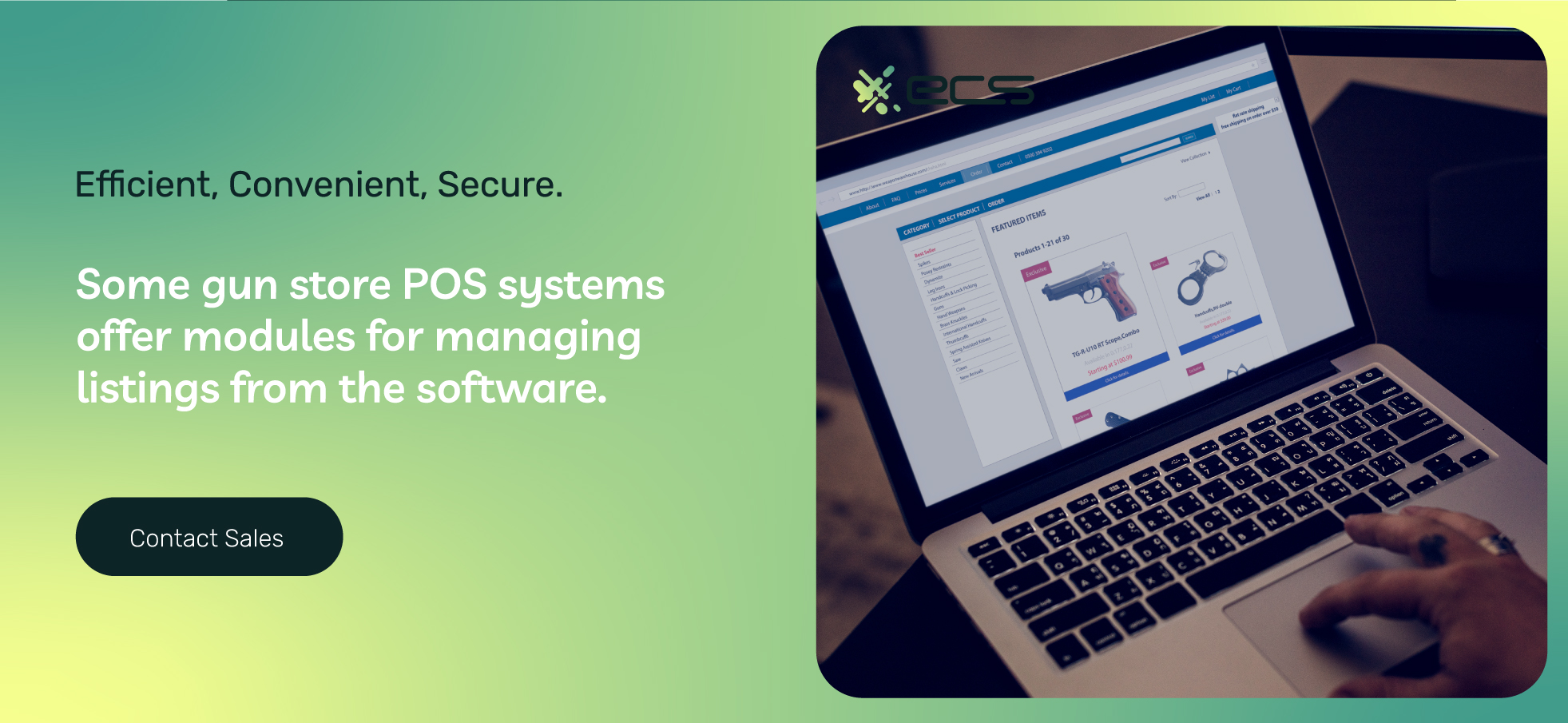
Online and E-commerce Integration
Many physical gun stores also have an online presence to take orders. Gun store owners can either ship these orders or hold them for in-store pickup. A POS system allows you to integrate online sales with your physical store sales.
Some gun store POS systems offer modules for managing listings from the software.
You can treat your shop’s listings as if you were selling them directly. This eliminates the need for manual listings and entering third-party auction sales into your software or bound book by hand.
ATF Compliance
If you manage a gun store, you’re already familiar with acquisition and disposition (A&D) records regulations regarding your Federal Firearms License (FFL) compliance requirements.
While you can do these manually, many gun stores use an ATF-compliant electronic bound book.
Most gun store POS systems will have their own ATF-compliant bound book systems included with the base software. However, sometimes, you must pay an additional fee to use this feature.
If you already use a third-party electronic bound book, ensure it is compatible with the POS software you are considering purchasing.
A POS system ensures a smooth firearms sales process by verifying and requiring correct and complete data before proceeding.
Employee Tracking
A POS system can integrate with your payroll and HR software, simplifying the timecard process. Each employee will have individual logins for easy hour tracking and seamless payroll integration.
Another benefit of POS employee tracking is that each transaction will log the employee who handled it. This makes going back to deal with any issue much easier. It also helps to reduce theft and implement other security measures that come with running a small business.
What To Look For In A Gun Store POS
Different POS systems will each have their own features that are catered to the specific needs of various gun shops. However, there are a few key features you want to pay special attention to when choosing a gun store POS.
Comparing the different features of various POS systems will help you choose a solution that’s right for your gun store.
Bound Book And e4473 Features
Bound Book And e4473 Features may be the most important for FFLs from a regulatory point of view. They ensure your paperwork is always accurate and up-to-date.
If you’re already using an electronic bound book such as FastBook or FFL Boss, then you want to ensure your new POS software is compatible. Many FFL POS systems will have integrations with third-party bound book services, but not all are compatible with all systems.
Switching to an all-electronic bound book offers more options for those who are currently using manual record-keeping for their firearms business. Many POS systems like Celerant will offer a built-in electronic bound book that is fully ATF compliant.
When choosing a vendor with their own built-in bound book, confirm they support importing your current records into their system.
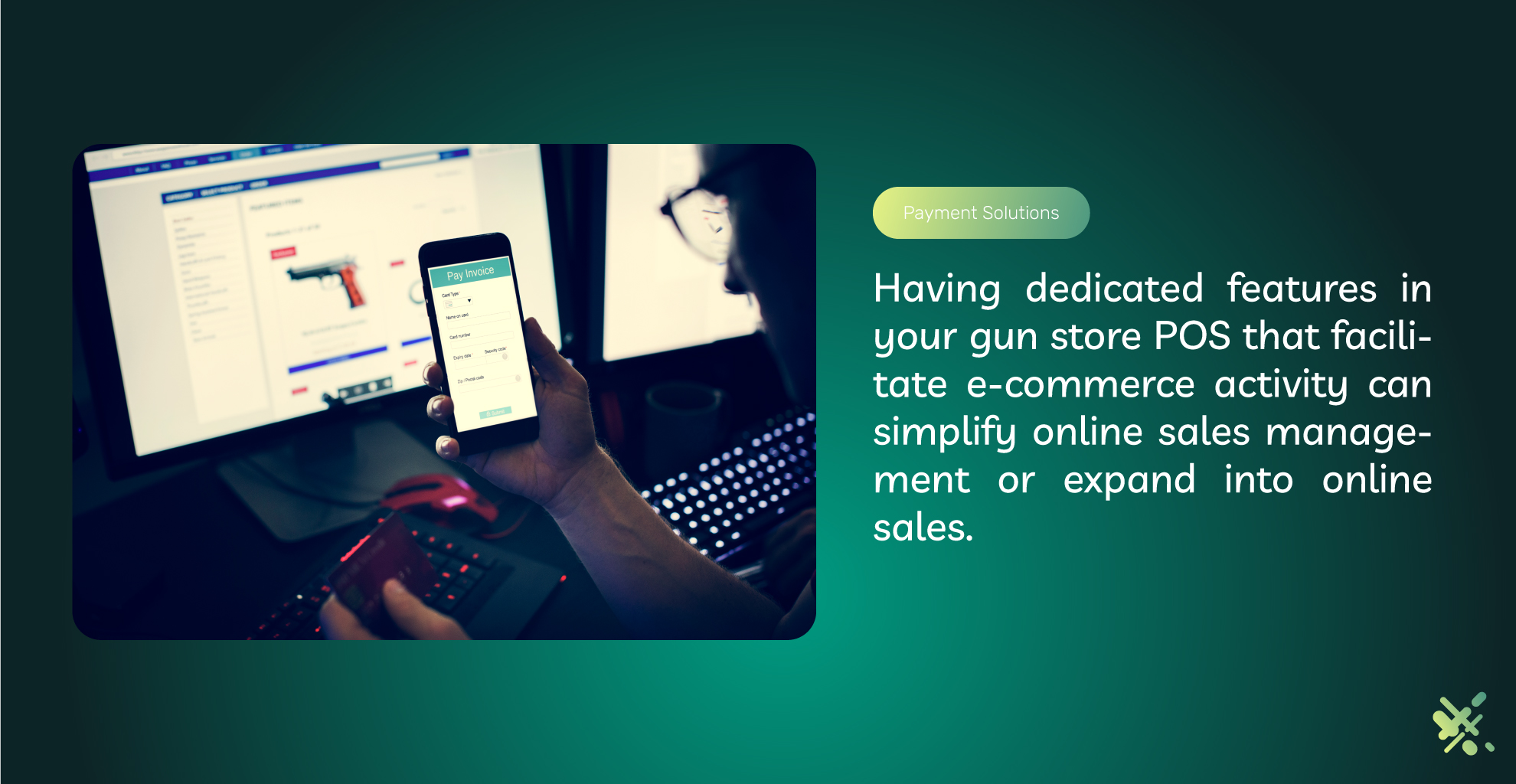
E-commerce Features
E-commerce features are especially important if your gun store already has an online presence where you make sales. However, even if you don’t currently have an online store, considering adding one can help increase your revenue.
Having dedicated features in your gun store POS that facilitate e-commerce activity can simplify online sales management or expand into online sales.
When choosing a POS vendor, ask about advanced features like integration with popular distributors such as Lipseys and other wholesale firearms dealers. This integration will allow you to quickly import products from a distributor database to populate your online store. Some systems also allow for importing data directly from gun manufacturers if you buy directly from them.
Having an e-commerce presence for your local gun store isn’t always about getting sales from anywhere in the world. It also helps to satisfy your current local customers who want more options when purchasing from your store.
Recent consumer trends have shown that customers want flexibility and options when buying from their favorite brands. Gun stores and gun enthusiasts are no different. Giving your loyal customers an option to order online helps build brand loyalty, increasing repeat business and customer lifetime value.
Gun Range Management
If your gun store also has a shooting range, you’ll want features built specifically for range management. While most POS systems have basic features for this, some systems have more robust features in this area for larger gun stores and ranges.
For example, certain POS systems come with featured range management that offers lane assignments and electronic range waivers. Additional features include driver’s license scanning modules. These quickly verify age and whether or not the customer has already filled out a waiver.
Finally, we all know a range can get busy, and wait times are the norm to get a lane. If you run a busy range, look for features that work with waitlists and scheduling. Some of these can send text alerts to customers when their lane is ready. As a result, customers have a much better experience when things get busy. It also helps your staff and range officers run a much more orderly range.
Remember that more advanced features like range management usually mean a higher monthly cost for the POS system. For business owners who run a basic gun shop or only offer limited FFL services, you can probably save money by avoiding some of these features when choosing your solution.
Mobile Processing
Gun stores commonly attend local gun shows around their state to help sell inventory and find new customers. If you want to accept electronic payments at these events, you’ll need mobile sales features to be included with your POS system.
Mobile features allow the POS system to work on different devices you already own, such as smartphones or tablets.
One important feature to be aware of when looking at mobile options is whether or not the software supports offline data capture. You may not always have an internet connection while at a gun show, so being able to capture data and then process it later is a must.
Most mobile payment options also allow you to make entries into your bound book from anywhere.
Online Auction Integration
We all know how popular gun auction sites like GunBroker have become. These sites move an incredible amount of merchandise. Therefore, gun dealers often use these to move inventory that may not sell as fast at their retail location.
If one or more of these online marketplaces or auction sites are a part of your sales strategy, you’ll need a POS system that integrates with those services.
When properly integrated, you can push your product listings directly from your POS terminal to the online marketplaces or auction sites. You can also manage your sales and payments from the same area within the POS.
This makes the auction sites like an extension of your own e-commerce store, saving time and money if you manage your auctions manually.
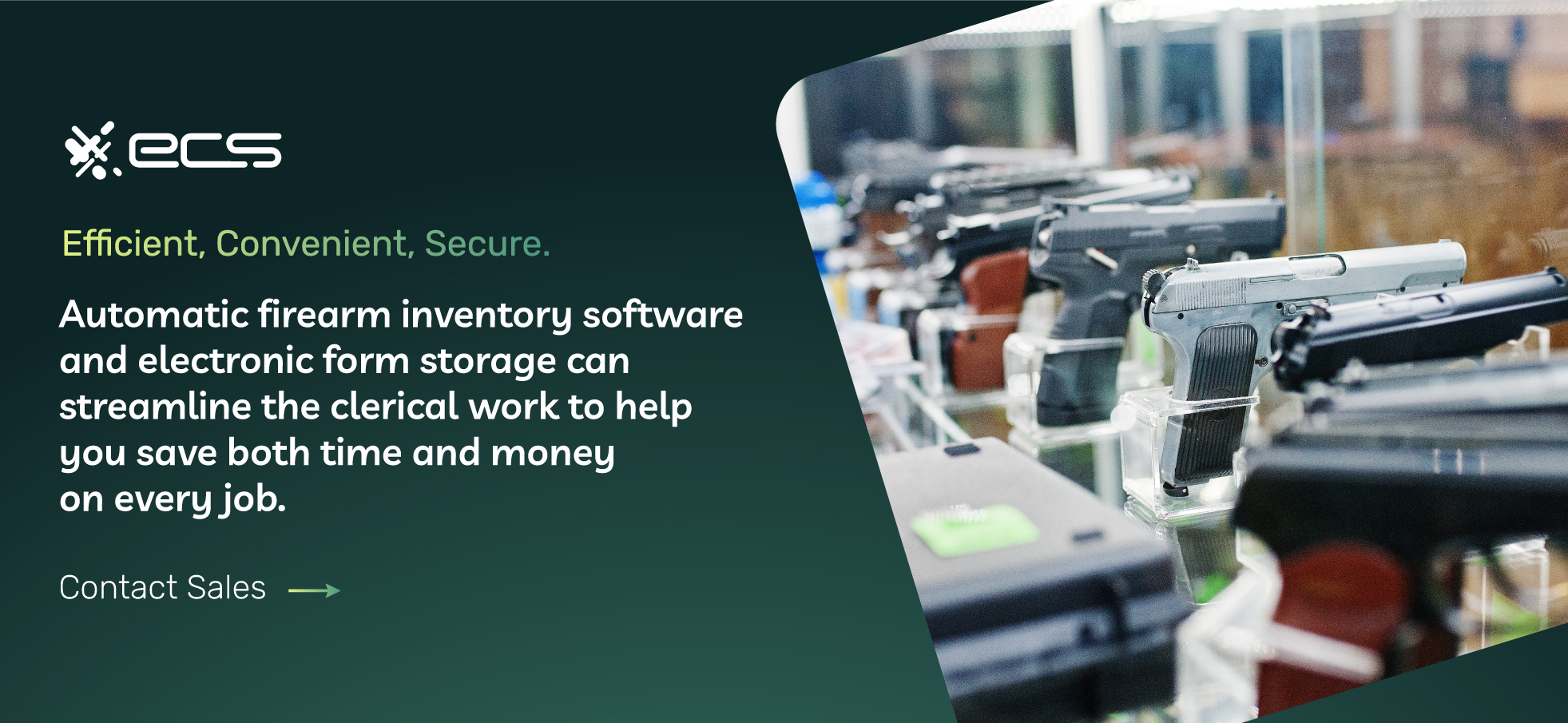
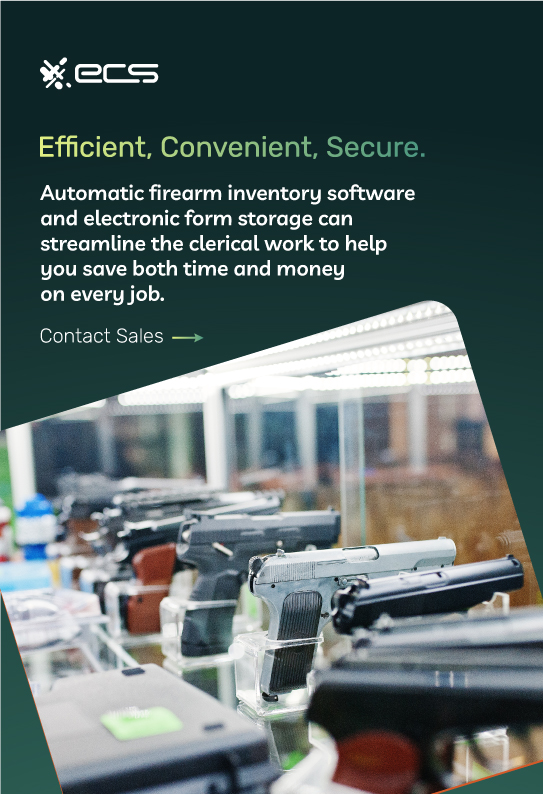
Gunsmithing And Inventory Management
Gunsmithing is more than just servicing firearms as an FFL. It also means complex inventory management and storing each gun entering your store.
When providing gunsmithing services, a POS with features built for that aspect of gun store management can make your job much easier.
Automatic firearm inventory software and electronic form storage can streamline the clerical work to help you save both time and money on every job.
Strong gunsmithing features can also help you create estimates and track the time spent on each job to maintain maximum profitability on every service request.
Memberships And Classroom Management
Gun store membership is commonly used for range access, special or private range access, or classes.
If you offer any of these services, check that your POS choice has built-in features to help you manage these areas easier.
Most of this will revolve around recurring billing, which needs to be a part of both your POS and your payment processor.
Gift Cards
Gift cards may not seem like a big deal, but these can help drive sales and repeat business, especially for larger gun stores that may also carry outdoor goods. A good POS system should have a built-in gift card system or a module available for a low-cost, additional fee.
This allows you to run your gift card program and manage it right from the POS system. Gift cards also allow you to give return credit via in-store credit, which helps keep money spent in your store even on returned items.
Marketing Tools
Some more advanced POS systems have built-in marketing tools such as analytics or ways to integrate your social media accounts with modules such as reward programs or reviews in your online store.
These features can be used to promote sales, gun ownership, or other marketing efforts if needed.
Choosing A Gun-Friendly Payment Processor
Once you’ve chosen your POS software based on the features you need, you’ll next need to look at choosing your payment processor. Most every POS system will work with outside payment processors, so you don’t have to choose the processor that may come bundled with the POS software that doesn’t suit your needs.
One important thing to be aware of is that FFLs and gun stores are considered high-risk in the credit card industry. The high-risk designation doesn’t mean the items being sold are risky. It’s based on the risk of chargebacks, fraud, and returns for those items.
Other factors that can determine high-risk transactions are things such as the average ticket size, which can be higher for gun purchases than for normal retail sales. Finding gun-friendly credit card processing can sometimes take a little extra effort.
Being high-risk doesn’t mean you can’t secure a merchant account, but you need a payment processor specializing in high-risk transactions and industries, such as FFLs and gun stores.
Leading payment processors such as ECS Payments are experienced in high-risk transactions and understand the firearm industry. Using a payment processor such as ECS Payments gives you the peace of mind of knowing your processing will not be closed or your bank account threatened.
We know that FFLs can sometimes have problems with certain unfriendly financial services to the gun community. Using an experienced high-risk processor helps you avoid those issues.
Payment Features
Another aspect of choosing a payment processor is to ensure they offer the features and tools you need to go along with your gun store POS system.
Mobile processing, recurring billing tools, and invoicing tools can complement your POS software and ensure your entire payment workflow is as efficient as possible.
Finally, your POS system will connect to your payment processor via the payment gateway. The payment gateway is the network that handles each transaction as it moves between the various financial institutions.
There are several payment gateways, and it’s important to check that the payment gateway you choose or want to use is compatible with your POS system before selecting.
Most common gateways should be compatible with most POS systems, but you always want to check for compatibility after you’ve decided on the features you need.
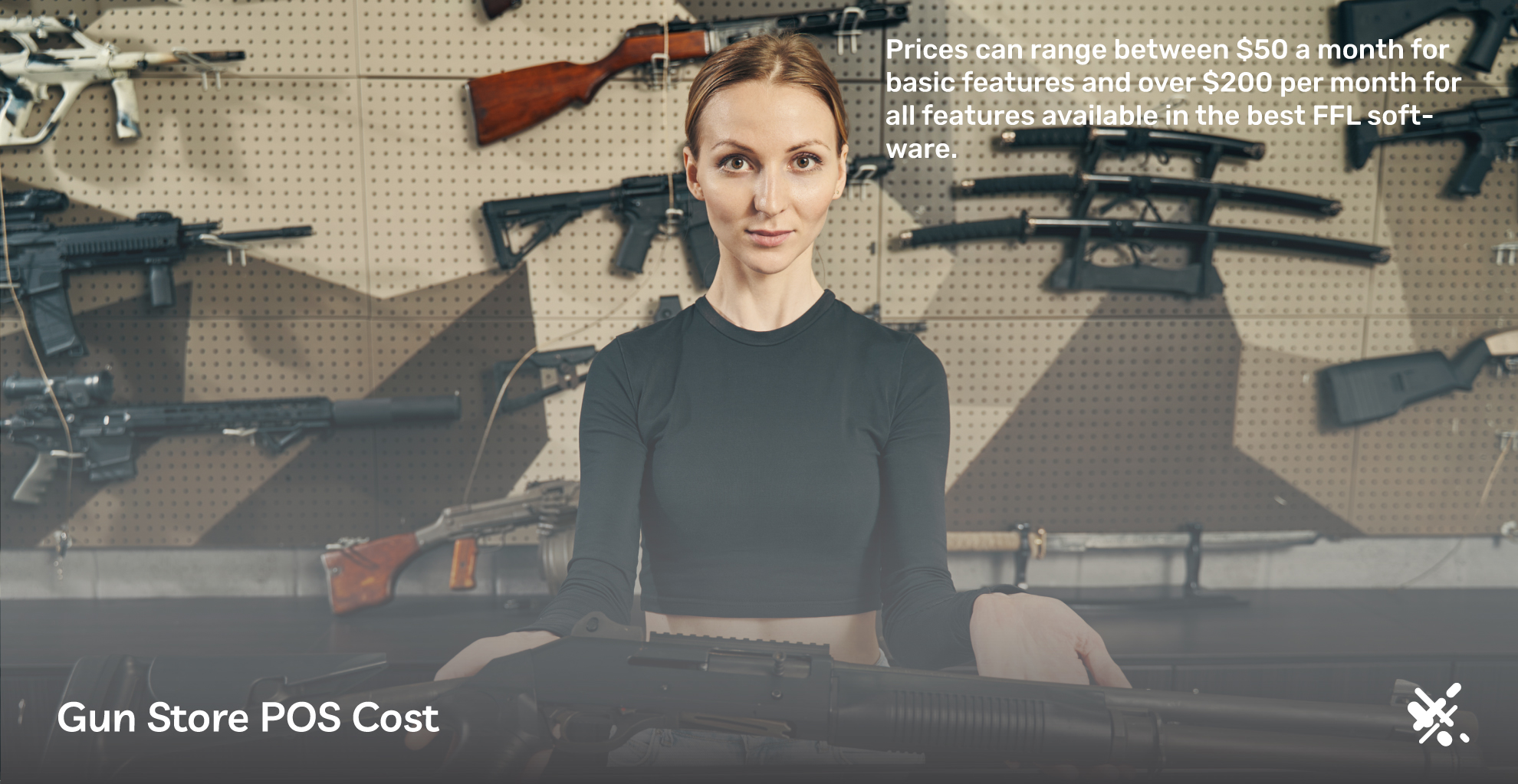
How Much Does A Gun Store POS Cost?
Regarding cost, gunshop software is sold via lease or monthly subscription price. A few are available for outright purchase at the full price upfront, but this is becoming less common.
Prices can range between $50 a month for basic features and over $200 per month for all features available in the best FFL software. Overall, the yearly cost of a gun store POS is between $700 and $2500, depending on the vendor and the options selected.
Separate Features
It’s also important to be aware of the different features or modules that may be sold individually or in a la carte. This can make the pricing somewhat confusing when trying to compare different vendors.
Try to find a vendor that offers POS gun software with the features you need built-in and bundled with the initial monthly price. Adding different features a la carte can balloon the monthly price for something that may have initially seemed like a great deal.
Cost Negotiation
Another tip is not to be afraid to negotiate with firearms software vendors. Many gun store POS systems do not list their pricing on their websites. Instead, you have to contact them to speak to a sales representative and get a demo before the pricing is revealed.
In these cases, there is wiggle room when determining your price. So, never be afraid to negotiate if the prices are not advertised. Even if prices are advertised, it never hurts to ask if any special pricing or discounts are available.
Firearms POS software vendors make their money on recurring sales month after month, so they will generally work with you to bring you into their ecosystem.
Long Contracts
Be cautious of long contracts of more than a year or two with gun store POS software. Some companies may try to get you to sign longer contracts for a lower price but always check the fine print. These contacts may have heavy penalties for early termination or automatic renewals well before the contract ends.
Signing a contract can sometimes bring you a lower price, but always do your due diligence to ensure it’s fair and provides you the benefits you expect from such a long-term relationship with the vendor.
Leasing Hardware
Finally, carefully go over any leasing agreements for hardware. Leasing can reduce the initial cost of the hardware, which is important when starting a gun store. But you’ll generally pay more over time. So, you need to decide if the benefits outweigh the cost in your situation.
More Help With Gun Store POS Systems And Payments
At ECS Payments, we work with FFLs and gun shops to help them secure the payment processing and financial services they need to be successful.
Our knowledge of high-risk processing means we can secure the lowest processing fees while still offering you the latest payment solutions to help your FFL business save money and increase customer satisfaction.
Contact ECS Payments today to learn more about our high-risk payment processing solutions built specifically for FFLs and gun store owners.
Frequently Asked Questions About Gun Store and eCommerce POS Software
A gun store POS system is a Point-of-sale software designed specifically to streamline firearm retailers’ operations. It offers essential functions such as regulation compliance, inventory management, and improved business processes. If you’re in need of a specific POS software for your firearms business, look no further than ECS Payments, we have dedicated partnerships with the world’s best gun store POS software.
A gun store POS system usually consists of three components: the POS hardware (payment terminals, card readers, and a computer), POS software (to provide additional business tools and manage transactions and operations), and finally, a payment processor (to facilitate all electronic transactions from credit or debit cards). If you need a payment processor for your firearms business, contact ECS Payments.
A gun store POS system offers several benefits, including better inventory and employee management, integration of eCommerce sales, ATF compliance, sales analytics, and more. Ultimately, it streamlines operations, enhances customer experience, and ensures regulatory compliance.
When selecting the right gun store POS system for your firearm business, you should consider features like bound book and e4473 capabilities, e-commerce integration, gun range management, mobile processing, online auction integration, inventory management, employee management, membership capabilities, and marketing tools. Additionally, they should choose a payment processor specializing in high-risk transactions and firearms such as ECS payments.
